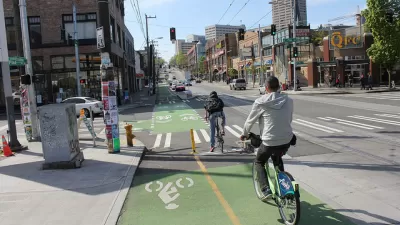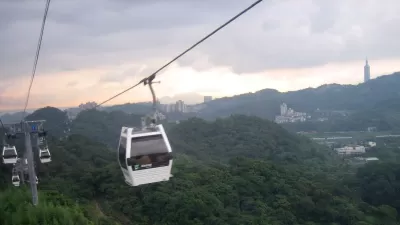Electronic passes used to board transit systems in the Seattle region could offer a new eye for Big Brother. According to privacy rights activists, the data in the employer-provided passes can be monitored by employers without employees' knowledge.
"While those riders enjoy not having to dig for change, their movements are recorded electronically on buses and at rail stations. Governments use that information to help divide the fare income and study travel patterns among seven different transit agencies in four Puget Sound counties.
But what thousands of commuters might not realize is that their movements also could be checked by their bosses."
Employers have the ability to monitor where their employees' transit passes are being used. Though the intention is to fight fraud, the ability also allows them to effectively see everywhere their employees go on public transit.
FULL STORY: Is Big Brother watching your ORCA card?

Planetizen Federal Action Tracker
A weekly monitor of how Trump’s orders and actions are impacting planners and planning in America.

Maui's Vacation Rental Debate Turns Ugly
Verbal attacks, misinformation campaigns and fistfights plague a high-stakes debate to convert thousands of vacation rentals into long-term housing.

Restaurant Patios Were a Pandemic Win — Why Were They so Hard to Keep?
Social distancing requirements and changes in travel patterns prompted cities to pilot new uses for street and sidewalk space. Then it got complicated.

In California Battle of Housing vs. Environment, Housing Just Won
A new state law significantly limits the power of CEQA, an environmental review law that served as a powerful tool for blocking new development.

Boulder Eliminates Parking Minimums Citywide
Officials estimate the cost of building a single underground parking space at up to $100,000.

Orange County, Florida Adopts Largest US “Sprawl Repair” Code
The ‘Orange Code’ seeks to rectify decades of sprawl-inducing, car-oriented development.
Urban Design for Planners 1: Software Tools
This six-course series explores essential urban design concepts using open source software and equips planners with the tools they need to participate fully in the urban design process.
Planning for Universal Design
Learn the tools for implementing Universal Design in planning regulations.
Heyer Gruel & Associates PA
JM Goldson LLC
Custer County Colorado
City of Camden Redevelopment Agency
City of Astoria
Transportation Research & Education Center (TREC) at Portland State University
Jefferson Parish Government
Camden Redevelopment Agency
City of Claremont





























